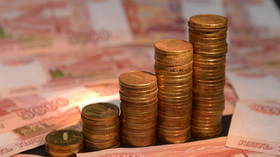Deal with OPEC helps Russia double its National Wealth Fund

The agreement between Russia and the Organization of the Petroleum Exporting Countries (OPEC) to cut oil output has brought huge benefits to the entire Russian economy and its National Wealth Fund (NWF).
“The NWF rose from 4.04 trillion rubles ($65.2 bln) to 7.7 trillion rubles ($124.3 billion), so the NWF actually doubled over the year. This largely indicates that the NWF resources through the fiscal rule have come exactly from the OPEC+ deal, increasing our reserves twofold,” Kirill Dmitriev, chief executive of the Russian Direct Investment Fund (RDIF), told TASS on the sidelines of the World Economic Forum in Davos.
Also on rt.com Russia's forex reserves reach pre-crisis levels, topping $555 billionSince the implementation of the production cuts, the Russian budget directly added 7 trillion rubles (around $112.9 billion), which does not include NWF assets, according to Dmitriev.
The group of 24 major oil producers, including Russia, has been trying to erase an oil glut and prop up prices since 2017 by implementing collective daily production cuts. The measures were increased in December, with collective daily production cuts set to 1.7 million barrels per day, and are likely to stay in place for the rest of 2020.
Also on rt.com Russia is now far less dependent on US dollar or any other foreign currency – central bankThe Russian economy has benefited from higher oil prices. In recent years Moscow has enforced the so called budget rule, meaning that if oil prices are higher than $42 per barrel, then the extra money from crude and gas exports is transferred to the NWF.
Thus the OPEC+ agreement could further help Russia implement various national projects as the RDIF could invest in them using these extra funds.
“This is a revolutionary story, when the deal does not merely come to the budget but also gives a strong boost to reserves,” Dmitriev stressed.
For more stories on economy & finance visit RT's business section













